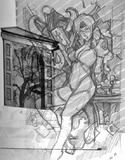Mostrar el registro sencillo del ítem
Filósofo-artista, metafísico-crítico de la cultura: dos aproximaciones a la interpretación de la relación Nietzsche Heidegger
| dc.rights.license | http://creativecommons.org/licenses/by-nc-sa/3.0/ve/ | |
| dc.contributor.author | Alzuru, Pedro | |
| dc.date.accessioned | 2009-07-21T18:51:51Z | |
| dc.date.available | 2009-07-21T18:51:51Z | |
| dc.date.issued | 2009-07-21T18:51:51Z | |
| dc.identifier.issn | Revs-0002 | es_VE |
| dc.identifier.uri | http://www.saber.ula.ve/handle/123456789/29028 | |
| dc.description.abstract | Considerado como un filósofo-artista, Nietzsche se debate entre la verdad de la reflexión filosófica y la ilusión y el error vital del artista. No obstante, para este pensador es más valioso el arte que la verdad al examinar la perspectiva cristiano - platónica, pues lo sensible se eleva sobre lo suprasensible y es más verdadero. Sin embargo, esta pretendida superación nietzscheana de la metafísica en la interpretación de Heidegger se resume a una inversión del platonismo, contrariamente a lo que Nietzsche expresa al referirse al arte en su función como el embellecimiento engañoso de la apariencia; de allí, el arte, como manifestación del mundo sensible, más que decir la verdad, funge de mentira optimista. La verdad nietzscheana se reviste del sentido trágico y pesimista de la existencia; más allá de una simple confrontación entre el mundo sensible e inteligible, Nietzsche no hace diferencia alguna entre los mundos aparente y verdadero. Precisamente para Heidegger, Nietzsche representa aquel pensador que se ubica al final de la metafísica, en él ha tenido lugar el olvido del ser; sin embargo, Heidegger se aparta de este camino al ver en Nietzsche aspectos tradicionalmente metafísicos (el ser, Dios, la libertad, el sujeto) y no netamente nietzscheanos (nihilismo, voluntad de poder, eterno retorno, superhombre, justicia, crítica, etc.), pero, por otro lado, hay rasgos comunes que comparten entre sí: la afinidad de filosofía y literatura, un discurso no tan estructurado científicamente, la reflexión sobre la historia de la cultura. Al mismo tiempo, confrontan en el pensamiento la rememoración heideggeriana a través de la metafísica y las “fiestas de la memoria” nietzscheanas, pues piensan el ser no como estructura sino como evento, el ser no es otra cosa que sus eventos. | es_VE |
| dc.language.iso | es | es_VE |
| dc.rights | info:eu-repo/semantics/openAccess | |
| dc.subject | crítica | es_VE |
| dc.subject | metafísica | es_VE |
| dc.subject | Ser | es_VE |
| dc.subject | filosofía | es_VE |
| dc.subject | literatura | es_VE |
| dc.title | Filósofo-artista, metafísico-crítico de la cultura: dos aproximaciones a la interpretación de la relación Nietzsche Heidegger | es_VE |
| dc.type | info:eu-repo/semantics/article | |
| dc.description.abstract1 | Seen as an artist-philosopher, Nietzsche is caught between the truth of philosophical thought and illusion and crucial mistake of artist. However, for this thinker is more valuable art that the truth when examining the prospect Christian-Platonic, since the sensitivity rises above suprasensible and what is more real. However, this purported overcoming of metaphysics in the interpretation of Heidegger is summarized an investment of Platonism, contrary to what Nietzsche express referring to art in its role as the beautification of the deceptive appearance, hence, art, as a manifestation of the world sensitive, rather than telling the truth, serves as lies optimistic. The truth according to Nietzsche, con tains the pessimistic and tragic sense of existente. Beyond a simple confrontation between the world sensible and intelligible, Nietzsche does not make any difference between apparent and real worlds. Precisely for Heidegger, Nietzsche represents one thinker that lies at the end of metaphysics, he has done oblivion beings; however, Heidegger departs from this path to see only traditionally metaphysical aspects (being, God, freedom, the subject) and not much of Nietszche (nihilism, will to power, eternal return, superhuman, justice, criticism, etc.), but on the other hand, there are commonalities shared between them: the affinity of philosophy and literature, a speech not so structured scientifically reflection on the history of culture. At the same time, it confronts the remembrance heideggeriana through metaphysics and “feasts of memory” of Nietzsche, therefore think beings not as structure, but as event, beings is nothing less than their events. | es_VE |
| dc.description.colacion | 62-72 | es_VE |
| dc.description.email | alzuru@ula.ve | es_VE |
| dc.description.frecuencia | semestral | es_VE |
| dc.identifier.depositolegal | 199702ME179 | es_VE |
| dc.subject.centroinvestigacion | Centro de Investigaciones Estéticas (CIE) | es_VE |
| dc.subject.facultad | Facultad de Humanidades y Educación | es_VE |
| dc.subject.keywords | Criticism | es_VE |
| dc.subject.keywords | Metaphysics | es_VE |
| dc.subject.keywords | Being | es_VE |
| dc.subject.keywords | Philosophy | es_VE |
| dc.subject.keywords | Literature | es_VE |
| dc.subject.publicacionelectronica | Revista Estética | es_VE |
| dc.subject.thematiccategory | Artes y Humanidades | es_VE |
| dc.subject.tipo | Revistas | es_VE |
| dc.type.media | Texto | es_VE |
Ficheros en el ítem
Este ítem aparece en la(s) siguiente(s) colección(ones)
-
Estética - Nº 012
enero - junio 2008



